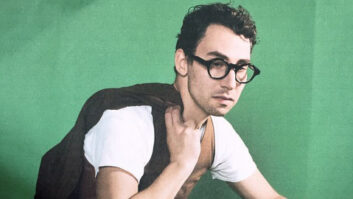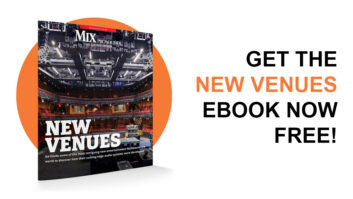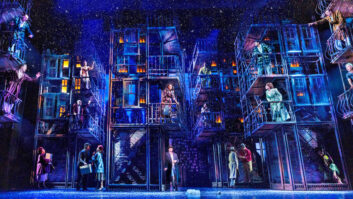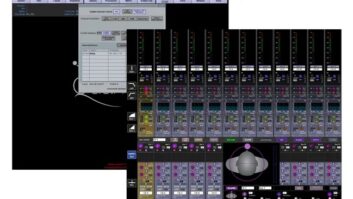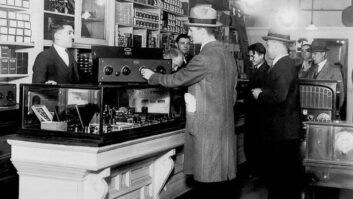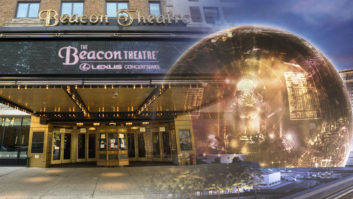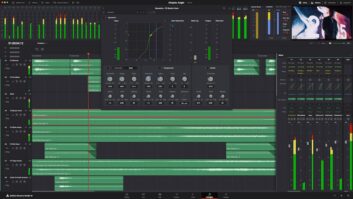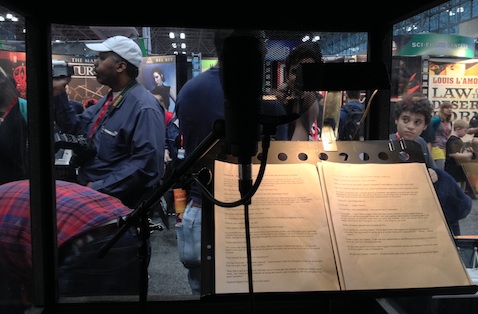
The annual New York Comic Con is a mecca for pop-culture fans; celebrating the latest in genre movies, TV, comics and toys, the three-day event draws more than 130,000 people every year to the Jacob Javits Convention Center. This year’s edition, held in October, was no exception, and with so much going on, ranging from star-filled panels to attendees’ outlandish costumes, it was often hard for exhibitors to stand out from the (packed) crowd. Audiobook imprint Penguin Random House Audio found a way, however, as it gave visitors a chance to get behind the mic and experience what it’s like to record an audiobook.
“This is our third time doing this at New York Comic Con,” said Aaron Blank, an executive producer for Penguin Random House Audio. “It gets a strong turn out, just by word-of-mouth, and it’s a great way to get people more interested in audiobooks.” While video game manufacturers built entire villages in adjacent halls in order to get attention, the publisher only needed a 3×5-foot recording booth and a sign inviting visitors to read excerpts from The Hitchhiker’s Guide To The Galaxy. The result was a steady line of attendees throughout the weekend, each one waiting his turn to spend a few minutes in the booth.
“Many of these people, they listen to audiobooks all the time and they want to try it out,” explained Blank. “After Comic Con, we go back, do an edit and email it to them, so they get a copy of the finished product, just for themselves.”
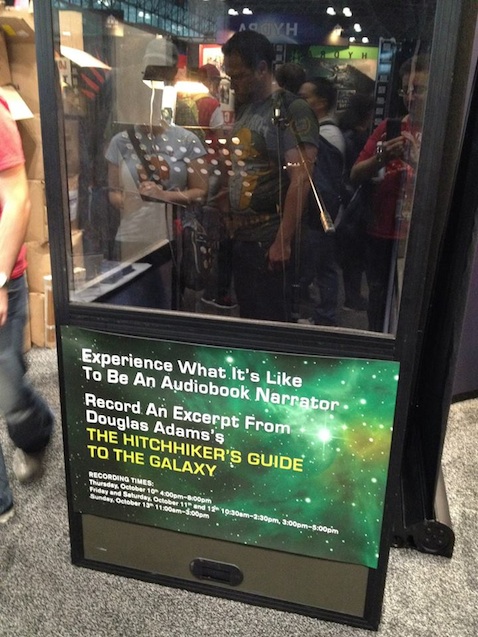
Blank designed the booth’s recording system to meet a specific set of criteria: “This is a very simple recording rig, but there’s a lot of interesting constraints. It has to travel, be lightweight, and also be slightly disposable in case there’s travel damage or travel loss. Also, sometimes we have staffers here who don’t have a lot of sound experience, so I had to make it truly as simple as possible so that they can run it. It’s just an Audio-Technica AT2020 in there, and a Zoom recorder. The rest is a music stand, cabling, pop filter, a pair of headphones and a boom stand.
“The recording booth itself was probably the hardest thing to find. It’s actually a booth used for translation—it shows up in a massive road case and hooks together with Velcro, of all things. It’s nowhere near sonically tight, but it’s certainly tight enough for this, and it’s the look and the feel of what we’re going for—plus it has a window, so if you’re walking by or waiting your turn, you can see what they’re doing inside.”
Working at the convention was a change of pace for Blank, who started out in theatrical sound engineering before moving into audiobooks. “As an executive producer, I get to pick titles that I want to get recorded on audio,” he said. “There’s three paths we can go down with it—if a voice is already attached to it, I deal with the logistics of getting them in one of our studios with a director; same thing if the author is attached to it; but the best part of my job is that I get to read books, think and come up with who is ‘the voice’ of this book in my head. Is it male, female, accented, young, old? Then I write the author and I say, ‘I’m so happy to be producing your book on audio; this is who I ‘hear’ reading it. Am I in the ballpark? What do you think?’ Then we get it recorded, proofed, corrected and on-sale at the same time as the hardcover.”
Blank’s audiobook projects typically take three to four months, from his first getting a title to it hitting the shelves at your local bookseller. “It’s a tight schedule,” he admitted, “and print vendors can turn things around faster than we can, because there’s only so fast that someone can read. We can get five guys editing it and five guys proofing it, but until the recording is done, our hands are tied.” Fortunately, the reading time for the Comic Con attendees was considerably shorter, and with that, our interview ended so we could step aside and let a Harry Potter classmate leave the booth while a zombie shuffled in, ready to not necessarily tear your ear off, but perhaps talk it off instead.

